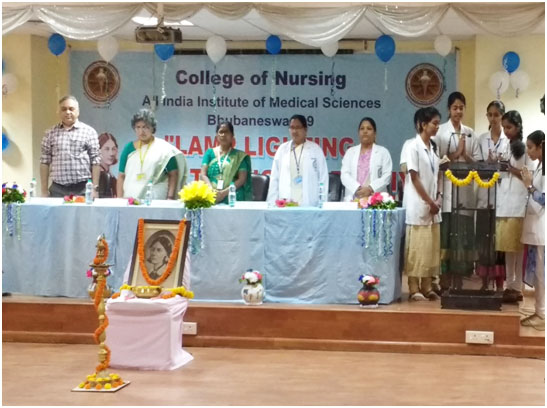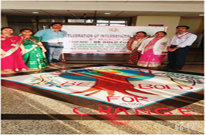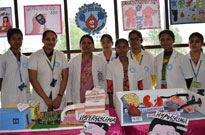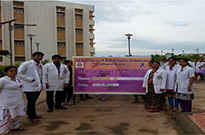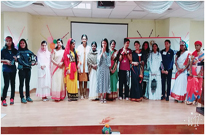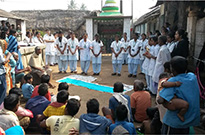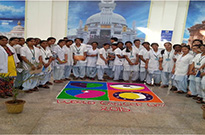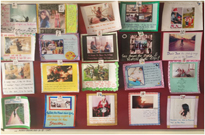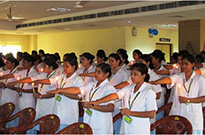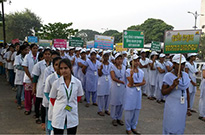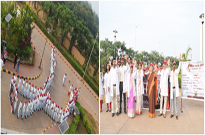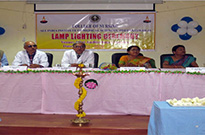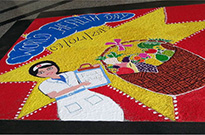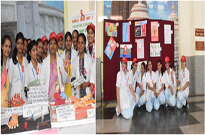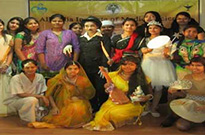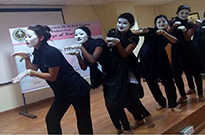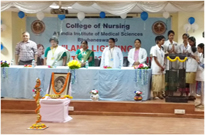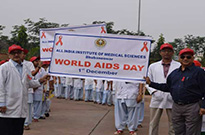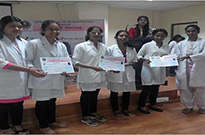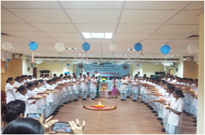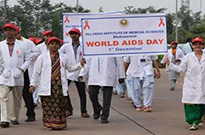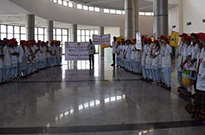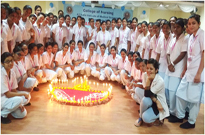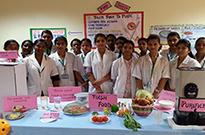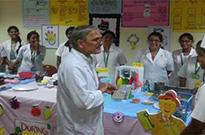College of Nursing
“Education is the most powerful weapon which you can use to change the world” ---Nelson Mandela
I am indeed privileged and honored to be part of such a prestigious institution. It gives me immense pleasure to channelize the vital resources in terms of manpower and infrastructure to produce the best nurses for our country. It is both an opportunity and an immense challenge that I am happy to accept.
The College of Nursing, AIIMS, Bhubaneswar aim to have a healthy blend of students and faculty from all walks of the country. It’s just like our students representing the rich diversity of our Nation. Students here get opportunities and exposure unparalleled as they get to mingle with fellow students from the length and breadth of the country. In addition, we have a very dynamic, young, and energetic group of faculty drawn from the best in the country.
We have one of the best faculty-student ratios i.e. 1:6 thereby guaranteeing good and healthy interactions. To add spice to that we have one of the best infrastructures in all the prevailing new AIIMS institutions.
I am happy to welcome the students to AIIMS Bhubaneswar and assure you the all-round development as a professional nurse to contribute to the welfare of society and humanity.
Philosophy
- The faculty of the College of Nursing aspires to launch our students into a world of opportunities for confronting the greatest health challenges through undaunted service to society, research, and scholarship.
- The faculty is committed to designing and implementing curricula in which students develop critical thinking, decision-making skills, clinical judgment, cultural sensitivity, and professional values and ethics in an increasingly complex health care system.
- Our formal and continuing education programs encourage self-directed learning for life-long professional development, enable the assimilation of new knowledge and new technologies to create and maintain required skills, and promote understanding of the changing environments in which professional nursing is practiced
- We believe the standards and excellence of nursing practice are derived from evidenced-based research, theoretical application, continuous self-evaluation of clinical outcomes, identification and resolution of practice issues, and interdisciplinary collaboration.
Academic Programmes
Undergraduate Courses: B.Sc (Hons) Nursing
B.Sc (Hons) Nursing is a Four-year duration course including six months of integrated practice. The course includes classroom learning and practical sessions. The medium of instruction is English.
A total of 75 candidates are admitted through the national entrance exam conducted by the All-India Institute of Medical Sciences, Delhi.
Postgraduate:
Master of Science (Nursing)M.Sc Nursing is a two years duration which includes classroom learning and clinical experience in respective specialties.
The Clinical Specialisations offered are
- Medical-Surgical Nursing*:
- Paediatric Nursing:
- Obstetric and Gynaecological Nursing:
- Community Health Nursing:
- Psychiatric Nursing:
*Sub-specialties available are Critical care nursing, Neurosciences nursing, Cardiovascular and thoracic (CTVS) nursing, Nephro-urology nursing, Orthopaedic Nursing, Gastroenterology Nursing, and Oncology nursing
Certificate Courses:Cerificate course in Infection control nursing
Post basic certificate course in Neonatal nursing
Classrooms
College of Nursing AIIMS BBSR has well-ventilated classrooms, Air Conditioned with comfortable seating arrangements. Each classroom is equipped with PC/Laptops, white projector screens; LCD, and a public address system/Sound System.
Laboratories
Maternal and Child Health Lab is well equipped with mannequins, models, instruments, and other necessary Audio-Visual Aids to facilitate simulated learning among students in various aspects of maternal care.
Pediatric Lab is furnished with state-of-the-art mannequins for hands-on training and skill development procedures for the students the laboratory also gives adequate exposure to the day-to-day practice prior to the posting in the clinical area.
Community Health Nursing Laboratory caters to the required articles needed by the students during the field visits. The lab is equipped with fifty community health bags with complete articles that the students take during community positing. Students acquire skills in different screening procedures through lab demonstrations. The lab has AV aids showing epidemiological determinants of disease and models explaining different levels of health care.
Nutrition Lab has a wide range of facilities like cookware and kitchen utensils for teaching therapeutic diets. Students learn about preparing nutrition.
Nursing Foundation Lab is equipped with mannequins, models, instruments, and other necessary AV Aids to facilitate learning related to the fundamentals of nursing and Advanced procedures.
Computer lab is equipped with 30 workstations to help the students to use Basic Applications like MS Word, MS Excel, MS PowerPoint, and Paint.
Library: The college of nursing has a departmental library with a collection of nursing reference Books and thesis. It also has a separate reading room for faculty and students in the department.
The faculty and students also have access to state of art central library (on membership) with large collections of Books, eBooks, journals, and access to various databases.
Regional Simulation Lab: The college of nursing has state of an art simulation lab with advanced high-fidelity mannequins as well as task trainers to train the nurses and other health care professionals of any region. It is also attached to the smart classroom for debriefing and a hybrid model of training.
Auditorium:
College of Nursing AIIMS Bhubaneswar has an attractive Mini Auditorium complex with a mini auditorium with a seating capacity of 200 and a board room attached to it.Mrs Dharitri Swain, Assistant Professor
- D.Swain, A descriptive study to assess the knowledge and practice of postnatal mothers regarding colostrum feeding in a selected hospital, Mangalore, Karnataka. NIGHTINGLE NURSING TIMES Feb 2010; 5(11):52-55.
- D.Swain, An analysis of the cultural beliefs and practices in pregnancy and child birth. NIGHTINGLE NURSING TIMES June 2010; 6(3):29-32.
- D.Swain, A case study-a rare presentation MRKH Syndrome. NIGHTINGLE NURSING TIMES April 2012; 8(1): 19-20, 56.
- D.Swain, Application of Roy's Adaptation model for women with Dysfunctional labour. NIGHTINGLE NURSING TIMES. November 2012; 8(8):57-60,64
- D.Swain. Why doesn’t mother reject fetus? The Immunological concept of pregnancy. Asian Journal of Nursing Education and Research.(July- Sept2013;3(3):183-187.
- D.Swain. Water birth is an alternative to Air birth- A Comprehensive Review article. Asian Journal of Nursing Education and Research. April-June 2013; 3 (2):69-78.
- D.Swain. An exploratory study on factors of hypothermia in neonates with special reference to nursing practices at Capital Govt. hospital, Bhubaneswar, Odisha. International Journal of Nursing Education. July- Dec 2013; 5(2): 56-61.
- D.Swain. A Comparative study of clinical outcome of patients’ undergone vaginal and abdominal hysterectomy. International Journal of Nursing Education and Research. January- March 2014; 2 (1):10-15.
- Swain D, A Study to Assess the Incidence and Risk factors of Surgical Site Infection following Caesarean Section in a Selected Hospital of Odisha. Indian Journal of Surgical Nursing (IJSN). September - December 2014.3(3):81-88.
- Swain D. Birth Preparedness, Complication Readiness and Participation in Maternity Care among Men in a Rural Community, Odisha, India. Int. J. Nur. Edu. and Research. Jan.-March, 2015; 3(1): 56-63.
- Swain D. Prevalence and Socio-Cultural Determinants of Uterine Prolapse Among Women and Its Impact on Quality of Life. International Journal of Obstetrics, Perinatal and Neonatal Nursing. 2015; 1( 2):14-25.
- Swain D. Colostrums Feeding Practices and Its Impact on Neonatal and Infant Health. Journal of Nurse Midwifery and Maternal Health. July - December 2015; 1 (2):89-98
- Swain D. Sex Education and Adoption Education among Adolescent-A Comprehensive Review of the Literature. Journal of Nurse Midwifery and Maternal Health. July - December 2015; 1 (2):99-108.
Mr Nanda Kumar Paniyadi , Assistant Professor
- Effectiveness of self instructional modules for teachers in management of behavioural problems in school children, Vol. 3; Jul – Sept 2008 – Kerala Nursing Journal (Official journal of Trainers Nursing Association of India, Kerala Branch)
- A Descriptive study to assess the anxiety level of relatives of the patient admitted in ICU’s of selected hospital of Udupi District. Sept 2008 - Ninghtingale Nursing Time
- A descriptive survey report from Udupi, Karnataka State – Expressed knowledge and attitude towards nursing by the people from different occupation, Nov 2008 - Ninghtingale Nursing Time
- Comparative study on Stress, Coping Strategies and quality of Life of Institutionalized and Non-institutionalized Elderly in Kottayam District, Kerala. 2009, Vol -23, No-1, P-79-87, Indian Journal of Gerontology.
- A study to determine the psychological consequences of Tsunami among Tsunami-affected people of Kollam district, Kerala, International Journal of Nursing Education, Jan –June 2011, Vol-3, No. 1, P- 4 to 7.
- Quality of life of clients with Alcoholic Dependence Syndrome attending and Non-attending alcoholics Anonymous group meetings, International Journal of Nursing Education, July-December 2011, Vol-3, No-2, P-92-95.
- Patients violence towards nurses: A Questionnaire survey, International Journal of Nursing, ( I ) July, 01, 2012.
- Educational Intervention on prevention of Uterine Rapture, Indian Journal of Physiotherapy and Occupational therapy, April-June 2014, Vol-8


